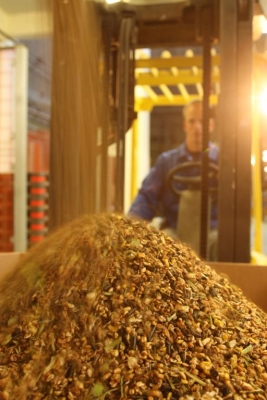Proteins up close
Of all the components of your horse’s diet, protein is probably the most misunderstood. Long assumed to function as an energy source for the body, protein mainly functions to provide amino acids (the building blocks of bones, muscles, and soft tissues) for growth and repair.
What are amino acids good for?
Virtually all of the horse’s vital processes, it seems. Amino acids are involved in the synthesis and the release of hormones, the synthesis of neurotransmitters and enzymes, and the regulation of sleep, appetite, and blood pressure, to name just a few functions.
But primarily, amino acids are needed for the formation and repair of muscle tissue and other soft tissues throughout the body. On a fat-free, moisture-free basis, they account for approximately 80% of a horse’s total structure.
Growing horses, which are ‘building’ new tissues as they mature, and horses used for breeding, have higher protein requirements than do mature horses being used for pleasure or performance. Whether working or idle, most mature horses need surprisingly small amounts of protein.
Inside a protein molecule
Proteins are “chains” made up of various combinations of the twenty-two different amino acids that exist in nature. Amino acids are relatively simple organic compounds, consisting of a basic amino group and an acidic carboxyl group.
Transport in the blood
When a horse ingests protein, enzymes and acids break up the chain of amino acids in the digestive tract, and the individual amino acids are absorbed through the wall of the small intestine and into the bloodstream via the liver. From there, they travel to the sites where they are most needed for growth or repair of tissues.
Good quality protein
A good quality protein source is a food that provides a sufficient amount of these essential amino acids, particularly the amino acids lysine and methionine. Lysine is often called the “first limiting” amino acid—meaning that if insufficient quantities of lysine are present, then the horse’s body will have difficulty using any of the other amino acids available. Methionine is second in importance.
Protein as energy source?
Can protein serve as an energy source? Well, yes, but metabolically it’s an expensive process, producing three to six times more heat than the breakdown of carbohydrates or fats and yielding considerably less energy. The heating factor might be beneficial in a cold environment, but it also might contribute to excessive sweating and possible heat exhaustion during hard work, especially in a warmer climate.



